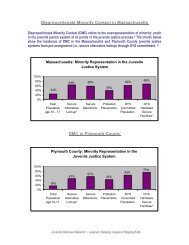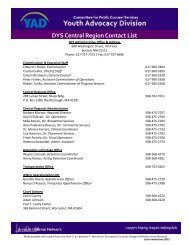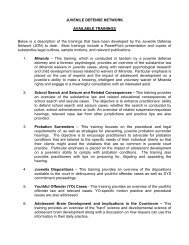States rethink 'adult time for adult crime' - the Youth Advocacy Division
States rethink 'adult time for adult crime' - the Youth Advocacy Division
States rethink 'adult time for adult crime' - the Youth Advocacy Division
You also want an ePaper? Increase the reach of your titles
YUMPU automatically turns print PDFs into web optimized ePapers that Google loves.
Teen Brains on Trial: Science News Online, May 8, 2004<br />
<strong>adult</strong>hood change depending on social circumstances, Greenough points out.<br />
Only 200 years ago, Western societies regarded 16-year-olds as <strong>adult</strong>s.<br />
"Brain science offers no simple take-home message about adolescents," says<br />
B.J. Casey of Cornell University's Weill Medical College in New York City. "It's<br />
amazing how little we know about <strong>the</strong> developing brain."<br />
Brain-scanning techniques, including <strong>the</strong> popular fMRI, remain a "crude level<br />
of analysis," Casey notes. At best, blood-flow measurements indirectly tap<br />
into brain-cell activity as people per<strong>for</strong>m a task, such as identifying emotions<br />
in posed faces, that may superficially simulate a real-world endeavor. What's<br />
more, many critical brain-cell responses are too fast <strong>for</strong> MRI to track.<br />
Brain data, particularly those on delayed frontal-lobe growth in adolescents,<br />
also need to be put in a cultural and historical perspective, Harvard's Kagan<br />
asserts. Frontal-lobe development presumably proceeds at roughly <strong>the</strong> same<br />
pace in teenagers everywhere. Yet current rates of teen violence and murder<br />
vary from remarkably low to alarmingly high from country to country, he notes.<br />
"Something about cultural context must be critical here," Kagan says. "Under<br />
<strong>the</strong> right conditions, 15-year-olds can control <strong>the</strong>ir impulses without having<br />
fully developed frontal lobes."<br />
If incomplete brains automatically reduce adolescents' capacity to restrain<br />
<strong>the</strong>ir darker urges, "we should be having Columbine incidents every week," he<br />
adds.<br />
Several research teams have now undertaken <strong>the</strong> difficult task of searching<br />
<strong>for</strong> links between specific traits of teens' brains and <strong>the</strong>ir real-life decisions<br />
and behaviors, says psychiatrist Ronald Dahl of <strong>the</strong> University of Pittsburgh<br />
Medical Center. "Brain data are eventually going to support reduced legal<br />
culpability <strong>for</strong> adolescents," Dahl predicts "but we're not quite <strong>the</strong>re yet."<br />
It remains to be seen where <strong>the</strong> Supreme Court is.<br />
Letters:<br />
I am not an advocate of capital punishment, but I wonder whe<strong>the</strong>r <strong>the</strong><br />
people and organizations who are so anxious to use findings on brain<br />
maturity to raise <strong>the</strong> age of capitol punishment have considered <strong>the</strong><br />
consequences of winning <strong>the</strong>ir case. One might argue on <strong>the</strong> same basis<br />
that anyone who has not yet reached <strong>the</strong> "age of brain maturity" should<br />
not be allowed to make potentially life-altering decisions. Should such<br />
people be permitted to volunteer <strong>for</strong> <strong>the</strong> armed services Should <strong>the</strong>y be<br />
denied access to any <strong>for</strong>m of weapon Should <strong>the</strong>y be permitted to<br />
participate in any high-risk sport Should <strong>the</strong>y be allowed to operate cars<br />
and o<strong>the</strong>r vehicles if <strong>the</strong>ir immature brains could lead <strong>the</strong>m to make bad,<br />
or even lethal, driving decisions Would it not be possible to argue that<br />
such measures would protect society at large<br />
Lance C. Labun<br />
Tempe, Ariz.<br />
file:///L|/JDN/Brain%20Resources/Brain%20Development/Mailing%20Packet/10.%20Teen%20Brains%20on%20Trial.htm (6 of 9)8/16/2006 4:45:04 PM
















